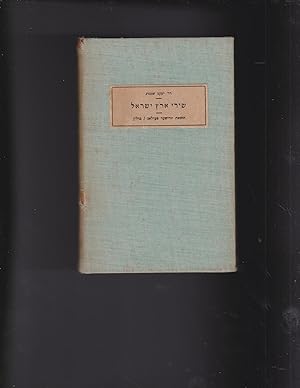Beschreibung
In Hebrew and romanized lyrics. At the end of each song is a short lexicon giving the German language equivalent to some of the Hebrew words. 208 pages. 17 x 11 cm, The last phrase of Hatikva is the older, original text, and so a former owner wrote in pen the revised text that became standard. With musical notations. Lyrics (romanized) also printed as vocalized text in Hebrew script. Includes unaccompanied melodies. Jakob Schönberg was born in Fürth, Bavaria on September 8, 1900. His father, David Schönberg, was chazzan (cantor) at the Claus-synagoge in Fürth. Schönberg's father recognized the boy's musical gifts early on and Jakob began piano lessons at the age of five. He attended the Israelitische Realschule in Fürth from 1906 to 1916, the Oberealschule in Nürnberg, from 1916 to 1919, and received further education at both the Technical High School in Darmstadt and the University of Berlin. He received his doctorate from the University of Erlangen in 1925. His dissertation, Die traditionellen Gesänge des Israelitischen Gottesdienstes in Deutschland (Traditional Songs of the Jewish Liturgical Service in Germany) received the highest grade. It was published the following year by Spandel Verlag of Nürnberg. The book analyzes the melodies found in Abraham Baer's cantorial anthology, Baal T'fillah, 1877. Schönberg apparently earned his living during Germany's Weimar Republic (1919-1933) as a pianist, music critic, conductor and composer. He wrote articles for the Nürnberger Zeitung and served as a musical consultant for Bavarian Radio in Munich. Bavarian Radio performed some of his orchestral compositions. He also worked in films as a "musical conductor and illustrator" and some of his film music was published by Schott's Söhne, Mainz, and Hawkes and Son, London. Schönberg was interested in composing instrumental music, especially orchestral. His first orchestral work, Prelude Symphonique, premiered in 1923. Although some music critics detected a hint of "Oriental" flavor in Schönberg's earlier works, his style of composition took a decidedly Jewish turn after the Nazis took power in 1933, and Jewish musicians could no longer be employed by Germany's state-supported cultural institutions. In 1934 he transcribed the folk songs and dance tunes of several halutzim (pioneers) visiting Germany from Palestine. The following year he published Shire Erets Yisrael (Songs of the Land of Israel), an anthology containing 230 Hebrew songs (Berlin: Jüdischer Verlag, 1935). From this time until, at least, when he left Germany, these Israeli melodies would figure prominently in Schönberg's work. He set several of them for voice with piano and voice with flute and viola. His Suite für Orchester, 3 Sätze utilizes a Horra melody from the anthology. Schönberg's orchestral Horras appear to have been extremely popular in Nazi Germany, and were performed numerous times by the Jüdischer Kulturbünde between 1936 and 1938, in both Berlin and Frankfurt-am-Main. He immigrated to England in August 1939, and then New York City in January 1948. His setting of the Sabbath prayer V'shomru was premiered by Cantor David Putterman and the Park Avenue Synagogue Choir in May of that year. The Hora movement from his Chassidic Suite for piano, 1937, was performed at Carnegie Hall by pianist Ray Lev in November 1948. He revised several of his pieces during his final years in New York, taught at New York's Trinity School and then was engaged to teach a number of musical subjects at The Carnegie School of Music in Englewood, New Jersey. He succumbed to a brain tumor on May 1, 1956. Bestandsnummer des Verkäufers 012673
Verkäufer kontaktieren
Diesen Artikel melden
Bibliografische Details
Titel: Shire Erets Yisra?el Shirey Eretz Israel
Verlag: Yudisher Ferlag, Judischer Verlag on behalf of Maccabi World Union Histadrut haMakabi beGermaniya vehistadrut HeKhalutz beGermaniya, Berlin
Erscheinungsdatum: 1935
Einband: Hardcover
Zustand: Very Good
Zustand des Schutzumschlags: No Jacket
![]()




